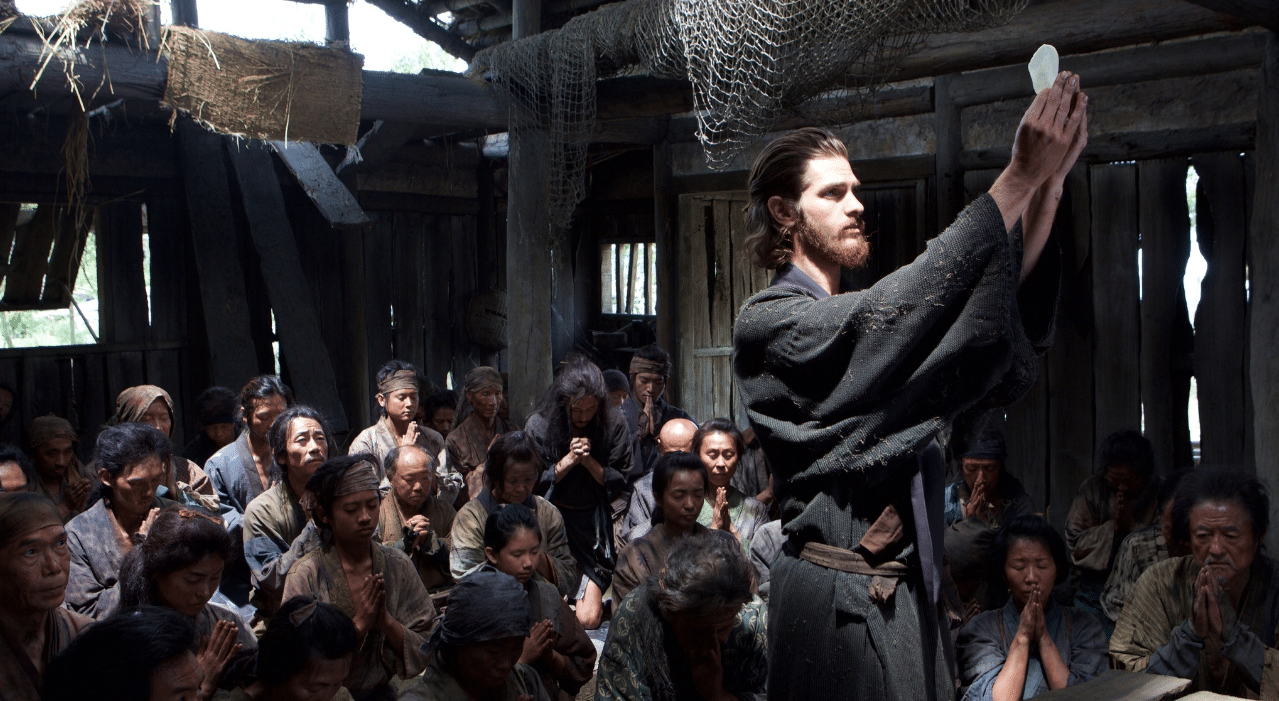 |
| Andrew Garfield as Fr. Rodrigues |
 |
| Liam Neeson as Fr. Ferreira |
 |
| Adam Driver as Fr. Garupe |
In my novel The Paradise Tree an Irish Catholic named Daniel O'Connor is slowly starving to death in his own country. He gets in line at a soup kitchen in Cork City but discovers the price of the soup is renouncing his Catholic faith. He sees others publicly denying their Faith in order to be fed. But his hand touches his rosary and he thinks of his family who taught him that death is better than apostasy. He steps out of line. He eventually finds food elsewhere. He survives the famine, goes to Canada and lives to be an old man with many descendants. He never takes his religion for granted, knowing that in spite of his human weakness, he was given the grace to remain steadfast. Sadly, many others in those days took the soup, apostatizing rather than starve to death.
I think that many Catholics have a sanitized view of martyrdom. We would like to think that every Christian threatened with death heroically resisted and won the martyr's crown. But we know from history that is not the case. There was once a heresy called Donatism which decreed that those members of the Church who had apostatized could no longer be admitted to the sacraments. But the Church condemned the heresy, holding out salvation to the most wretched sinners and apostates, as long as they sincerely repented, which in the early Church often meant years of public penance. That is because the Church has always been aware of human weakness. Did not St. Peter deny Jesus on Holy Thursday, to repent with many tears and atone with years of preaching, penance and ultimately his own martyrdom? We may not deny Christ with our words but we deny him whenever we sin, and whenever we neglect to stand up for the Gospel. We fear the displeasure of our neighbors and co-workers, of being shunned by our own, of being cancelled on the internet. How would we react if threatened with violence? Do we know? Unless it has happened to us already, we probably do not. "For you have not yet resisted unto blood, striving against sin." (Hebrews 12:4)
Silence directed by Martin Scorsese is one of the most powerful Catholic films of the twenty-first century so far, in my experience anyway. It authentically represents the unremittingly sadistic persecution of Christians in 17th-century Japan, as well as the courage and devotion of the martyrs who overcame the world, the devil and themselves. Based upon a true story, Silence is the film version of the novel of the same name by Shusaku Endo. From Catholic Stand:
To give a brief plot summary, Silence is set 1643, after the Japanese persecution of the Church led to Catholics going underground. In response to the reports that Jesuit priest Fr. Christovão Ferreira has apostatised and is now collaborating with the persecutors, Fr. Sebastian Rodrigues and Fr. Francisco Garrpe travel to Japan in order to minister to the hidden Catholics and to discover the truth about Fr. Ferreira. With the help of Kichijiro, a Japanese Catholic who apostatised to save his life, they find these hidden Catholics, but Kichijiro betrays Fr. Rodrigues to the authorities. Fr. Rodrigues is eventually forced to witness the brutal torture of some Japanese Catholics who have already apostatised, and is told that the torture will not end until he also apostatises by trampling on an image of Jesus called a fumie. Although he does not want to profane the image of Jesus, he cannot endure witnessing this torture, and so apostatises in order to save the victims. (Read more.)The film portrays Fr. Rodrigues as hearing the voice of Christ telling him to trample the image of Himself. It is this scene which disturbs so many believing Catholics, since we know that apostasy is a sin and the God would never command us to sin. However, it was my impression that the young priest has lost his mind, which is perhaps another form of martyrdom. The Japanese method of combining physical agony with mental torment is akin to the brainwashing techniques of modern totalitarian states or even to what we know about MKUltra. Fr. Rodrigues steps on the image after having endured a long imprisonment and semi-starvation in a cage during which time he was forced to watch and listen to Japanese Christians being tortured to death. Plus he has been inundated by the sophistry of the apostate Fr. Ferreira and the Japanese intellectuals. But even when he steps on the fumie, it is with tears of anguish, amid a mental and physical collapse. It obviously does not make him happy to step on an image of Jesus; he does not feel contempt for the Faith but overwhelming shame at his weakness.
Andrew Garfield plays the part of the young Fr. Rofrigues with devastating brilliance. Adam Driver is great, too, as Fr. Garupe, who wins the martyr's crown. And Liam Neeson is haunting as the apostate Jesuit Fr. Ferreira, a shell of a man, who like Fr. Rodrigues succumbs to the mind-bending torture techniques. According to First Things:
Garfield does an extraordinary job of conveying Rodrigues’s alternating states of idealism, shock, doubt, and anguish, as he struggles to maintain his beliefs. Driver is equally memorable in his supporting role—never more so than when he dives into the ocean, desperately trying to save a group of Christians who are being mercilessly thrown into the sea, bound tight with bamboo vests, for refusing to renounce Christ. And, doing some of his finest acting since Schindler’s List, Liam Neeson is amazing as the defeated Ferreira, a shadow of the man he used to be, even as he still exhibits signs that his apostasy may not fully have taken hold. (Read more.)

















No comments:
Post a Comment